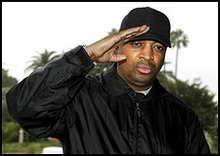Home > Artists Break With Industry on File Sharing
Edito Internet Music Trade-Exchange Rates USA

A prominent group of musicians and artists, breaking with colleagues and the major entertainment studios, is urging the Supreme Court not to hold online file-sharing services responsible for the acts of users who illegally trade songs, movies and software.
by Jonathan Krim
The group, which includes representatives of Steve Winwood, rapper Chuck D and the band Heart, said in court papers to be filed today that it condemns the stealing of copyrighted works. But it argues that popular services such as Grokster, Kazaa and others also provide a legal and critical alternative for artists to distribute their material.
"Musicians are not universally united in opposition to peer-to-peer file sharing" as the major records companies claim, according to a draft of the group’s court filing. "To the contrary, many musicians find peer-to-peer technology . . . allows them easily to reach a worldwide online audience. And to many musicians, the benefits of this . . . strongly outweigh the risks of copyright infringement."
The arguments are a stark counterweight to an aggressive push by the major recording and movie studios, and hundreds of musicians, actors and composers, to persuade the Supreme Court that file sharing damages the livelihoods of artists by robbing them of proper compensation for their work.
Specifically, the studios want the court to rule that Grokster is liable for the file sharing by many of its users because it is primarily used for piracy and because it does not take steps to prevent it. The court is scheduled to hear the case March 29.
But the artists opposing the industry’s position said shutting down the major file-sharing services, which are used by tens of millions of people worldwide, would instead rob them of a chance to gain exposure and income.
Before online file sharing, "distribution of recordings to retailers was controlled largely by a few large national record companies and by several ’independent’ labels," they argue. "Young people aspiring to be musicians faced daunting odds of ever being signed by a record label."
One musician, Jason Mraz, said half of the fans who pay to see him in concert heard about him through illegal downloading, according to the court filing.
Meanwhile, file sharing gives accomplished artists, such as Janis Ian, a chance to control distribution of their work that might no longer be deemed worthy of commercial promotion and sales, the group said.
Attorneys for Grokster argued in its court filing that file-sharing services are used extensively for distributing works legally, either by permission of the artist or because copyrights have expired or were never sought.
As a result, the company argues, it meets the legal standard set by the Supreme Court in 1984, when it ruled that Sony Corp.’s Betamax television recorder was not liable for copyright infringement because it had substantial legal uses.
The entertainment industry’s position also was opposed today by other file-sharing firms, major telecommunications companies, electronics makers, and coalitions of computer scientists, inventors, consumer and digital-rights advocacy groups.
They argue that holding technology creators, or the companies that handle Internet traffic, liable for the acts of their users would make it too risky for innovators to develop products that have legal uses and which enhance the enjoyment of digital entertainment.
"This case is simply the latest in a long string of instances in which copyright owners, frightened by a new technological development" seek to place restrictions on electronic devices, Internet access services, and even on personal computers to try to prevent piracy, said a filing by the major telephone, wireless and Internet service providers.
Instead, said companies including SBC Communications Inc. and Verizon Communications Inc., the entertainment industry can properly continue to sue individual file-swappers who break the law.
The Recording Industry Association of America has sued more than 6,500 people, and announced another 753 suits yesterday, including against some Grokster users.
The telecommunications companies also said Congress should decide how to punish services that exist solely to encourage and enable piracy.
The Distributed Computing Industry Association, which represents file-sharing and other technology firms, said the entertainment industry’s real agenda is to protect its monopoly.
Grokster "threatens that monopoly by providing a near cost-free distribution mechanism, which supports far more content than even Web-based distribution systems," the group said.
Other groups filing briefs in support of Grokster’s position include the Consumer Electronics Association, the Computer & Communications Industry Association, Consumers Union, the Consumer Federation of America, and Public Knowledge, a digital-rights advocacy group.




